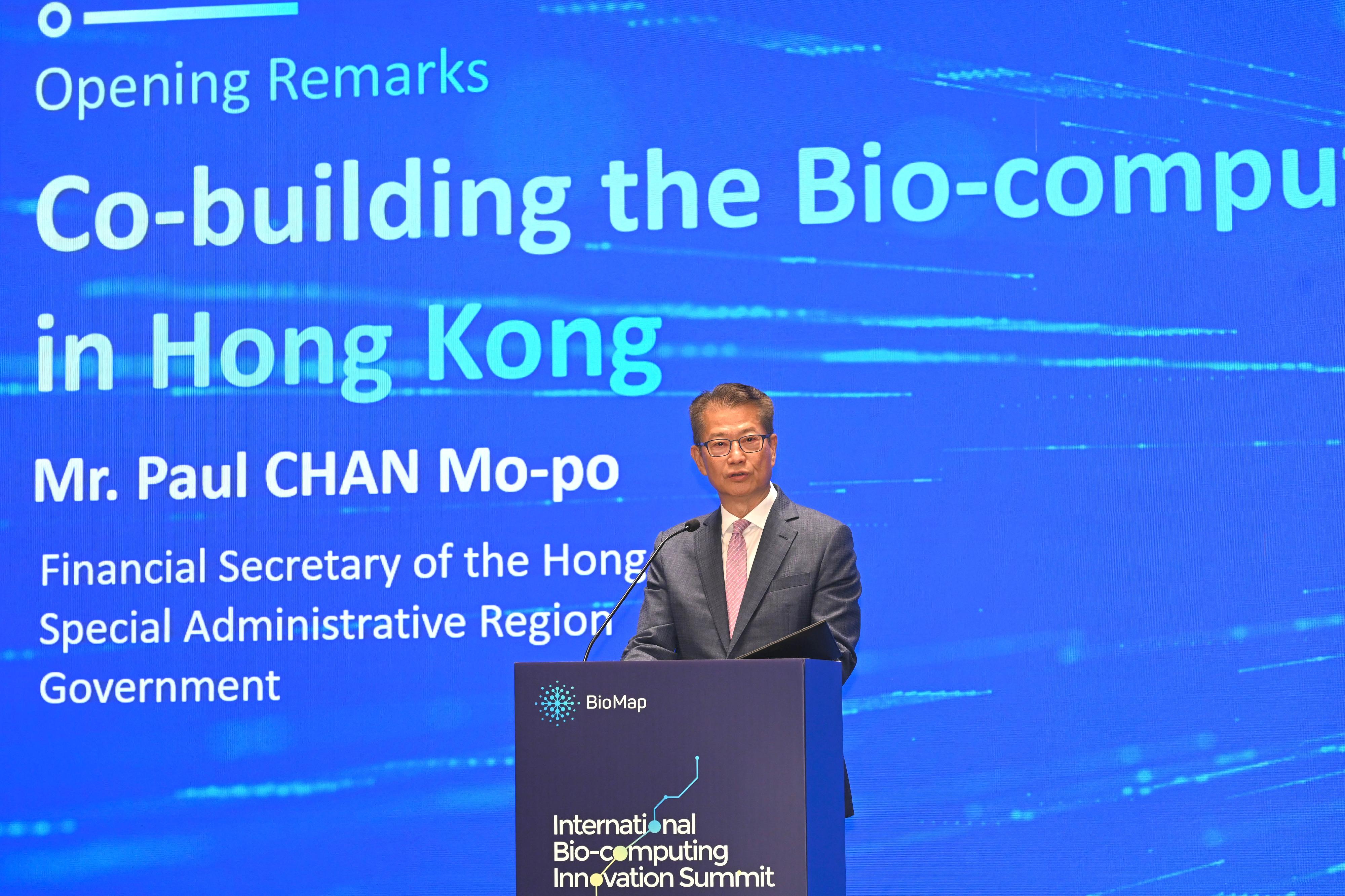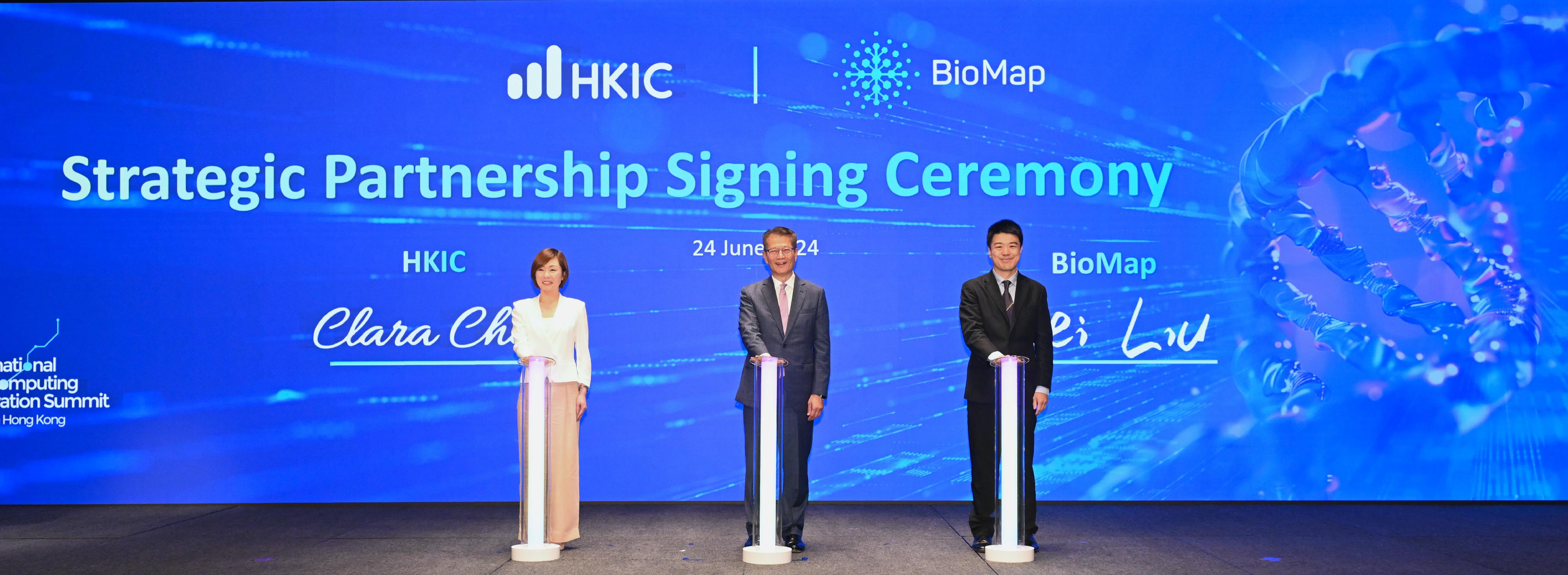Speech by FS at International Bio-Computing Innovation Summit (English only) (with photos/video)
Following is the speech by the Financial Secretary, Mr Paul Chan, at the International Bio-Computing Innovation Summit today (June 24):
Robin (Chief Executive Officer and co-founder of Baidu, Chairman and Co-founder of BioMap, Mr Robin Li), Liu Wei (Co-founder and Chief Executive Officer of BioMap), Clara (Chief Executive Officer of the Hong Kong Investment Corporation Limited (HKIC), Ms Clara Chan), distinguished speakers and guests, ladies and gentlemen,
I am pleased to join this inaugural International Bio-Computing Innovation Summit, and the launch of BioMap's first AI for Life Science Hub here in Hong Kong. Today, we will also witness the signing of a Strategic Partnership Agreement between the Hong Kong Investment Corporation Limited and BioMap.
I am also delighted to extend a warm welcome to Mr Robin Li, who has come to Hong Kong specially for this event and the signing ceremony.
The relationship between artificial intelligence and life science is transformative, and holds immense potential to drastically change the pharmaceutical industry and the medical and health sector. Large Language Models, or LLMs, have enabled researchers to decode protein or molecular sequences, generate new protein structures and construct new combinations with unprecedented speed. This capability will not only accelerate the drug discovery process but also significantly reduce costs.
And LLMs in life science certainly have far-reaching applications. AI-generated protein (AIGP) platforms and other bio-computing innovations will not just benefit pharmaceutical product development and bring improvements to human health, but also create new solutions for industrial production, agriculture, consumer products, and above all, for our sustainable future.
BioMap is certainly a pioneer – and leader – in this field. Using its AI LLM, that is xTrimo, BioMap is diving deep into unmasking nature's rules and creating novel therapeutic solutions. "AI for Life Science", as the theme of BioMap's InnoHub to be established in Hong Kong, beautifully encapsulates the company's vision.
Hong Kong's potential for biocomputing
This is a vision that Hong Kong shares, too. The combination of AI and life science is opening up a new frontier in bio-computing. Hong Kong has solid foundation in both areas, and I believe that we should endeavour to accelerate the development of bio-computing so that we could seize the "first mover advantage".
First, we boast a robust ecosystem for innovation. We are home to some of the world's leading universities and research institutions, producing groundbreaking work in both biological sciences and computational technology.
Yet we recognise that our strengths in basic research must be complemented by stronger translational research, outcome commercialisation and industrialisation capabilities. That is why we have emphasised the need to develop a complete innovative industry chain from upstream to downstream.
Stepping up co-operation with sister cities in the Guangdong-Hong Kong-Macao Greater Bay Area will accelerate our endeavours. In particular, we are working to set up an InnoLife Healthtech Hub in the Hong Kong-Shenzhen Innovation and Technology Park in the Lok Ma Chau Loop, attracting top-notch life and health research teams, talent, and organisations from around the world to establish there.
Second, AI infrastructure. One of our key initiatives to support this ecosystem is the establishment of an AI supercomputing centre at Cyberport. This facility will begin its first phase of operations in the second half of 2024. Upon completion of its second phase, the supercomputing centre will offer a computing power of 3 000 petaFLOPS by early 2026. This computational capability will support research and development in artificial intelligence, life science, and other cutting-edge fields.
We are also going to provide subsidies to support local universities, research institutions, and business enterprises in using these supercomputing services, thus empowering research breakthroughs.
Third, the convergence of data. This is an area where Hong Kong enjoys an advantageous position. Under the "one country, two systems" framework, we continue to maintain the free flow of information and data. At the same time, with the support of the Central Authorities, we are working to enable the orderly flow of Mainland data to Hong Kong for research and development, on the premise that data security is properly protected.
Finally, Hong Kong as an international financial centre. Hong Kong has a complete funding chain, ranging from a rich private equity and venture capital ecosystem to a deep and wide listing platform. The establishment of the HKIC is a milestone development. The company will not only invest, but also help channel other possible funding sources into enterprises and projects, maximising Hong Kong's support for innovative technologies, new business models, new sectors and relevant ecosystem building.
Looking beyond
Ladies and gentlemen, the strategic co-operation between the HKIC and BioMap that we are witnessing today underscores our belief in the promising future of integrating AI and life science. BioMap's InnoHub is set to become a global focal point for research in biocomputing, a hub for relevant translational research and outcome commercialisation, a platform for fostering co-operation among innovators, the industries and investors, and a base for talent development.
Talent, in particular, will be of utmost importance to our AI-powered future. Companies like BioMap and others with cutting-edge technologies are collectively establishing a vibrant AI industry in Hong Kong. Their technologies and entrepreneurship, along with the R&D (research and development) work and job opportunities that they create, will help nurture an AI-literate workforce with multidisciplinary knowledge which is vital for enhancing our competitiveness and attracting more tech companies to cluster in the city.
And I wish to highlight that this project marks the second strategic partnership announced by the HKIC in just two weeks. Whether it is AI for industrial production, or AI for life science, Hong Kong is committed to growing AI as a pillar in our technological development, and capitalising on its vast potential to transform industries and to nurture talent of the future. I am confident that more and more tech companies will choose Hong Kong as their base for R&D and international co-operation as well as a platform to explore the broader Asian and global market.
And of course, we welcome companies such as BioMap to list on our Stock Exchange, using our world-class fund-raising platform to grow bigger and stronger.
Today's inaugural Summit has gathered many experts in the field, and I look forward to the new thoughts and wise counsel that will inspire our future development direction, both in Hong Kong and beyond.
I wish you all a very successful summit, and the best of health and business in the time to come. Thank you.

